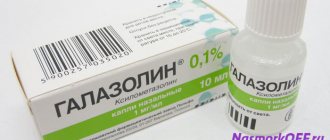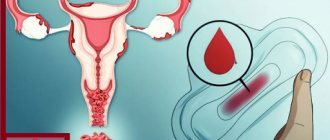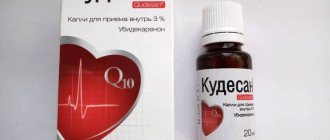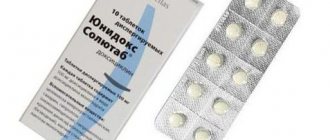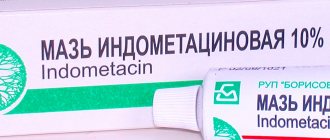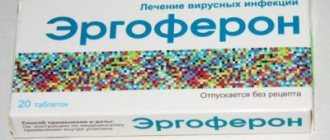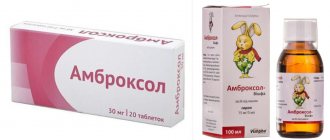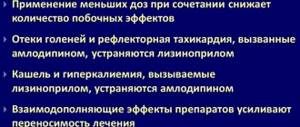Release form and composition of the drug
Pressed multicomponent homeopathic tablet, odorless, sweetish taste, uniform structure throughout the entire volume. It has a white color and a regular flat-cylindrical shape with a chamfer.
Dentokind is produced in a lightproof brown glass bottle of 150 pcs. Packed in a box with the manufacturer's logo and a photo of the child. Instructions included.
The medicine contains herbal ingredients. The composition includes the following active ingredients:
- Chamomilla recutita or Chamomile extract – 15 mg,
- Belladonna extract – 15 mg,
- ferrum phosphoricum or iron phosphate – 15 mg,
- hepar sulfuris or liver sulfur – 15 mg,
- extract of Pulsatilla pratensis or Lumbago meadow – 15 mg.
Indications for use
Due to its herbal composition, Dentokind is used when specific symptoms appear. These include:
- painful sensations caused by the process of teething (we recommend reading: what drops exist that facilitate the process of teething in children?),
- increased sensitivity, swelling of the gums,
- disturbance of the rhythm of sleep and wakefulness due to painful sensations,
- the appearance of anxiety and increased irritability,
- profuse drooling,
- fever accompanied by fever over 38C and vomiting,
- diarrhea.
READ ALSO: What gels exist to make teething easier?
Dentokind: instructions for use for children, price, reviews, analogues
The drug belongs to homeopathic remedies, has been used for a long time and has proven itself well among buyers.
The therapeutic effect, unlike local anesthetics, does not occur immediately, but lasts longer. As a rule, this happens the next day.
Dosage form
Dentokind is produced in the form of tablets that need to be dissolved. The package contains 150 tablets, and the bottle itself is made of dark glass to reduce the effect of sunlight on the active components.
Description and composition
Dentokind contains 5 active ingredients and several excipients, including lactose. The amount of each active ingredient in one tablet is 15 mg.
The drug is available without a prescription and has a high safety profile. Thanks to the combined composition and the positive effect of each component on the body, the medicine successfully reduces the severity of painful sensations during teething.
Dentokinda can also be used to relieve other symptoms that occur due to teething: ear pain, gum sensitivity, diarrhea, fever. In some cases, the medicine helps to cope with the child’s irritability, which increases during teething due to constant discomfort in the oral cavity.
The pharmacokinetics of the drug have not been studied, but its maximum effectiveness is manifested not when swallowed orally, but when the tablet is dissolved in the oral cavity.
Despite the ambivalent attitude of many people towards homeopathic remedies, parents write in reviews that Dentokind tablets are quite effective and significantly alleviate the baby’s condition. Besides this, the decision in favor of the drug is often made due to the affordable price and the large number of tablets in the package.
Homeopathic remedy.
for adults
The drug is not used to treat adult patients.
for children
The drug is used for symptoms that occur during the eruption of baby teeth in children. It helps eliminate gum sensitivity, swelling, inflammation, excessive restlessness and irritability of the child, diarrhea, fever, and ear pain.
The drug is not prescribed during pregnancy and lactation, as it is intended to treat teething pain in children.
Side effects
There were practically no side effects during treatment with Dentokind. In very rare cases, allergic reactions to the drug have been reported. On the first day of treatment, there may be a slight deterioration in well-being, but such symptoms should quickly subside with subsequent improvement.
There is no data on possible interaction of the drug with other drugs.
Overdose
No cases of overdose have been registered, however, the official instructions indicate an amount equal to 12 tablets (corresponding to 0.1 bread unit) as the maximum daily dose.
Storage conditions
The drug is stored under normal conditions with a temperature range from 15 to 25 degrees. Dentokind belongs to the group of over-the-counter medications.
The cost of Dentokind is on average 593 rubles. Prices range from 472 to 1032 rubles.
In terms of the established composition and release form, the product does not have similar drugs.
There are also no analogues of this method of treatment for children, taking into account the expected effect of its use and the wide range of diseases that can be treated through the use of this medicinal substance.
If you need to replace Dentokind with a similar product, your doctor may advise:
- Solution "Dantinorm Baby". This is also a homeopathic remedy that contains ivy, chamomile and rhubarb. It is packaged in portions and is used internally in children of any age.
- The drug "Kalgel". This dental product works thanks to lidocaine and cetylpyridinium, which effectively eliminate pain and have antiseptic properties. The drug is approved from the age of five months.
- Gel "Dentinox". Its active ingredients are chamomile extract and lidocaine, and there are no age limits for the use of such a product. This gel can be used both for the eruption of the first teeth in infants and for the painful appearance of molars in schoolchildren.
- "Cholisal" product. It includes the antiseptic component cetalkonium chloride and the anti-inflammatory component choline salicylate. This gel is used not only during the appearance of new teeth, but also for stomatitis, cheilitis, gingivitis and other inflammatory processes in the mouth. It is used in children from 1 year of age, but is sometimes prescribed to infants, but only after consulting a doctor.
In addition, if a teething baby has a high fever and severe pain, the doctor will prescribe analgesics and antipyretics approved for childhood, for example, Nurofen, Panadol, Ibufen, Efferalgan or Calpol.
It is very simple to dissolve and prepare the medicine for a child. It’s easy to verify this - the process is presented in the following video.
Instructions for use and dosage of Dentokind
The tablets should be taken half an hour before meals. You must first rinse your mouth with boiled water. The tablets need to be dissolved slowly.
When treating infants in the first year of life, it should be crushed into powder and dissolved in a teaspoon of warm boiled water. Another way is to sprinkle the resulting powder mixture onto the pacifier and give it to the baby.
The dosage of the drug should be selected by a specialist. General recommendations on how much to give to a child:
- Infants and children under 3 years of age should be given one tablet at intervals of 60 minutes when acute symptoms occur. The maximum allowable amount is 6 tablets per day. If the symptoms are mild or the pain has changed from acute to sluggish, then the dosage should be reduced - 1 tablet. Take three times a day.
- For children from 3 to 6 years old with severe pain symptoms, you need to dissolve 2 tablets every 60 minutes. The maximum allowable amount per day is 12 tablets. After the acute pain is relieved, the dosage should be reduced to 3 times a day, 2 tablets.
Five days is enough to relieve symptoms. If necessary, you can extend the course of treatment to seven days. If no improvement is observed after a week, you should consult a specialist.
Dentokind: instructions for use for children, price, reviews, analogues
Dentokind is a homeopathic remedy used to alleviate the condition of infants during teething.
There are practically no contraindications, but for certain diseases of patients, the use of dentokind is undesirable.
Teething in babies does not always go unnoticed. The baby cries, is capricious, puts his fists in his mouth, and does not sleep well. Sometimes the temperature may rise sharply and the stool may deteriorate.
The German homeopathic drug Dentokind has proven itself on the positive side, and now children can easily tolerate the appearance of new teeth.
Let's consider the methods of using Dentokind, the recommended dosage and analogues of the drug.
Sometimes the appearance of a new tooth can be similar to a viral disease or problems with the gastrointestinal tract. The child has a fever, refuses to eat, does not want to play, and does not sleep well. The baby cannot talk about his troubles, so the mother must carefully examine the baby’s body for manifestations of the disease.
If the child is already 5 months old, it is necessary to carefully examine the mouth. When teething, a pink/red swelling or a white stripe will appear on the gum. The baby experiences increased salivation and the need to bite something or put his fists in his mouth.
Actions of the mother during teething in the baby:
- constantly wipe drool on your chin with a soft cloth to avoid irritation on the skin;
- pick up and offer the breast more often;
- It is forbidden to lick a pacifier that has fallen on the floor and give it to the baby;
- It is forbidden to rub alcohol-containing tinctures into the gums for up to a year.
The German company Deutsche Homoeopathie-Union has developed a homeopathic remedy to relieve painful teething symptoms in children. This natural, safe remedy will help you painlessly go through one of the most important periods in your life - the appearance of teeth.
Description of the drug
Dentokind for children is available in tablet form. One capsule contains the following medicinal plant extracts:
- chamomile;
- belladonna;
- lumbago.
The composition also contains microelements:
- iron phosphate;
- calcium with sulfur.
The medicine is produced in tablet form. The capsules crumble easily and dissolve in water. The medicine can be freely purchased in Russian pharmacies without a prescription. The price is high (700 rubles), but the tablets are enough for more than one tooth. The shelf life of the medicine is about five years.
How to use tablets to relieve pain in a child. To do this, simply crush the pill with a spoon and dissolve the powder in boiled water (a teaspoon is enough).
An older child can swallow the pill on his own, because it tastes sweet and does not cause discomfort.
Dentokind does not affect the intake of other medications, so it can be used in combination with other medications.
After taking the medicine, the baby quickly calms down, the pain does not bother him for 1.5 to 2 hours in a row. Children under one year old can be given Dentokind every hour (in case of acute pain syndrome), but it is not recommended to exceed the daily dosage.
The drug should not be given for more than two weeks.
Homeopathic remedies do not burden the child’s liver and kidneys.
Older children should be given two pills every hour, but not exceeding the daily dosage. When the acute pain passes, you can give a couple of pills three times a day (6 tablets in total).
Holisal
Polish tooth gel Cholisal contains anise extract and synthetic ingredients. The gel is applied to the inflamed area before feeding the baby to numb the gums. Three times a day is enough.
However, the drug can cause allergies and other side effects. Cholisal is not recommended for use in infants under one year of age due to the ethyl alcohol content.
Teething medications should not be used to relieve fever or cold symptoms not related to toothache.
Dantinorm baby
The French drug Dantinorm baby is safe for infants, as it is based on extracts from medicinal herbs.
This homeopathic remedy is packaged in disposable ampoules for oral administration; you can take them with you to the clinic or for a walk. If the baby becomes capricious from pain, you can immediately apply the medicine.
The ampoules contain extracts of rhubarb, ivy and chamomile. The drug does not contain dyes, flavors or other harmful inclusions.
Viburkol
German rectal suppositories Viburkol also belong to homeopathic remedies. They contain extracts of plantain, nightshade, belladonna, chamomile and lumbago. Candles can be used not only for teething, but also for cold symptoms to relieve fever and pain. Candles are placed every 6 hours until the pain subsides.
Dentinox
Dentinox gel from a German company with lidocaine and polidocanol has a high analgesic effect in combination with chamomile extract. The gel is safe for children, as it does not contain alcohol and has only a local effect. However, the drug is not suitable for babies under one year old; it can only be used after consultation with the pediatrician.
Gel for gums Baby Doctor “First teeth” is odorless and tasteless. Contains extracts of beneficial plants - chamomile, plantain, marshmallow, echinacea, marigold. All plants have a complex effect on gum tissue, relieve inflammation and pain, and soothe the baby.
Babydent
Bebident drops containing benzocaine instantly relieve pain effects by blocking the conductivity of nerve receptors. The child's temperature and tactile sensitivity to pain decrease. A couple of drops three times a day are enough to make the baby feel comfortable. However, an overdose of drops can lead to undesirable effects: swelling of the mucous membrane, urticaria and difficulty breathing.
Dentinox N
Dentinox N gel can be used to relieve pain in infants during teething. The gel contains strong pain-relieving ingredients - lidocaine and polidocanol. Lidocaine has a freezing effect and suppresses the sensitivity of nerve cells.
Polidocanol is a complex substance of a new generation that relieves inflammation and stops bleeding. The gel also contains chamomile extract, which has a calming effect on irritated gum mucosa. The medicine does not contain alcohol.
Available without a prescription.
Pansoral
Pansoral First Teeth has age restrictions because it contains ethyl alcohol. The drug is approved only after 2.5 years. The gel contains extracts of chamomile, sage and marshmallow.
The gel is applied to the teething area and rubbed in a little. The effect is almost instantaneous: pain stops, swelling subsides, tissues calm down. There are no contraindications for use; the gel is sold without a prescription.
Kalgel
Kalgel contains lidocaine and ethanol. The drug quickly blocks the conduction of nerve endings. Kalgel also fights microbial activity, cleansing the mucous membrane from their effects.
Dentists recommend using the product from five months of age when the baby begins teething. The gel has an immediate effect on the affected area, but its effect does not last long. Therefore, Kalgel is often used to relieve acute pain.
Kalgel has many contraindications, so it should not be used without consulting a pediatrician.
Homeopathic medicines cause the least side effects and are therefore more preferable for young children. However, before choosing, you need to carefully study the list of active ingredients, read the contraindications for use and additional information.
If there is great resistance to taking drops and gels, you can use rectal suppositories with an analgesic effect.
You need to be very careful when using a drug with lidocaine: it can block the sucking reflex, which will negatively affect the child’s nutrition.
Among all drugs, three groups can be distinguished:
- popular;
- fast-acting;
- with long-lasting action.
Cholisal has the longest effect, Kalgel is the most popular, and Kamistad-gel baby can be used from the age of three months.
Homeopathic remedies stand apart because they are not medicines in the truest sense of the word. The advantage of homeopathic medicines is complete safety. Among homeopathic remedies, Dentokind for children has a complex effect and is used sparingly.
Homeopathic remedies are also distinguished by their cumulative effect, that is, they have a pronounced prolonged effect.
Homeopathic teething tablets Dentokind have an effective complex effect on the gums, are easy to use and have no side effects on health.
The tablets can be sucked, or you can crush them into powder with a spoon and dilute them in water. Kids take the medicine without whims and quickly calm down when they feel the pain relieved.
Therefore, a timely consultation with a pediatrician will help find the cause of the child’s illness.
- Colgate 32%, 1506715067 32067 – 32% of all
- Splat 24%, 1119011190 24190 – 24% of all
- ROCS 16%, 74877487 16t87 – 16% of all
- Sensodyne 11%, 51875187 11Q87 – 11% of all
- New pearls 10%, 4874 votes4874 votes 10H74 votes – 10% of all
- President 6%, 2823 votes2823 votes 6 (23 votes – 6% of all
The appearance of teeth in babies causes a storm of delight among their parents. The first time this most often occurs when the baby reaches 4-7 months of age, however, in some infants the process may begin earlier.
It's no secret that such an event is often overshadowed by unpleasant and even painful sensations.
Advances in modern pharmacology, in particular the drug Dentokind, make it possible to reduce their intensity and sometimes completely remove such symptoms.
It is recommended to slowly dissolve the drug in the mouth, and if the child is under three years old, the tablet is dissolved in a teaspoon of water. It is best to give Dentokind half an hour before feeding, and if the child has just eaten, taking the tablet should be postponed for 30-40 minutes.
To eliminate acute symptoms, the remedy is given to a small patient every hour, but subject to the following conditions:
- if the baby is not yet three years old, a single dose is one tablet, and the permissible amount per day is 6 tablets;
- If the child is already 3 years old, he should receive 2 tablets at once per dose, and accordingly, he can be given no more than 12 tablets per day.
Dantinorm baby and other analogues
There are no analogues that are completely identical in structural composition in Russia. However, drugs with similar therapeutic effects are listed below:
- Dantinorm baby drops are a homeopathic remedy. Has a pronounced analgesic effect. However, it is better to use Dentokind tablets, since the duration of the local anesthetic effect of the drops does not last so long.
- Kalgel,
- Pansoral first teeth – gel,
- Babident,
- Kamistad gel.
Contraindications
The medicine does not have clear general indications for its practical use.
There are some individual contraindications to the use of this drug:
- Allergic reactions to individual components of the product used.
- Lactose deficiency in its various expressed forms.
- Individual types of immunity of the sick child’s body to the described type of tablets.
- Chronic lactose deficiency in the body of a small child.
- Incompatibility of the components of the tablets with the enzymes secreted by the child’s body.
- Other types of individual contraindications.
Only the doctor treating the child has the right to accurately determine the existing contraindications to the use of such a drug and establish a certain procedure for prescribing this drug.

